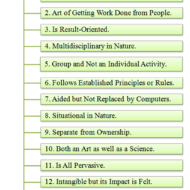Posted by Managementguru in Business Management, Organisational behaviour, Principles of Management
on Mar 2nd, 2014 | 0 comments

Nature of Organizational Planning What is Planning? “Planning is an intellectual process, the conscious determination of courses of action, and is a continuous process of decision making with built in flexibility.”- Herold Koonz and Weirich Planning is the most basic and primary of all management functions on the premise of which other functions evolve. It would be appropriate to compare planning to the basement or foundation of a building upon which the entire system rests. Planning bridges the gap from where we are to where we want to go. Planning involves selecting the best objectives and deciding on the suitable course of action. When we talk about planning, control is another entity that tags along like inseparable two-sides of a coin. Without planning there is no control and without control planning becomes meaningless. NATURE OF PLANNING: Prime function of management: Planning is the key to all other functions of management like organizing, leading, staffing and controlling. Is a continuous process: Plans need periodic review in the wake of external environment and internal resource potential and thus is a continuous process. Is an intellectual process: What is to be done, when, who and how are the very important questions that loom before a manager before making every decision. He has to use his intellect in order to make the right plans before acting. Is all pervasive: It penetrates right from the top to the bottom level of management, but it is the responsibility of the managers or executives at the top level to make the right moves at the right time. Is flexible: One has to understand that flexibility is restricted when it comes to irretrievable costs already incurred in fixed assets, training, advertising etc. Is goal oriented: Planning starts with setting up of objectives and completely goal oriented. TYPES OF PLANS: Purpose or Missions: Basic task of an organization. For example, teaching and research can be attributed as the basic function of an educational institution; the purpose of business is to produce, distribute goods and make a surplus. Objectives: These are the goals that have to be accomplished by the organization. Corporate companies chart out their production plan well in advance to meet the requirements on time. For this they break the objectives into short term goals i.e., for a quarter based on the sales forecast. This kind of planning gives clarity and direction for the production team to achieve the goals. Strategies: These are the set of action plans designed in order to achieve the future objectives backed up by long term perspective in the wake of environmental analysis and give direction in which the resources have to be channelized. Policies: These are basically the guideline books that direct the course of the organization’s function as what to do and what not to-do. They see to that the decisions made fall well within certain boundaries in order to ensure fair and equitable treatment to all the employees. HR policies govern all the functions related to pay, promotion and other disciplinary mechanisms related to the work force. Procedures: They are programmes designed to carry out the activities of the organization in a specified manner. The procedures for placing a purchase order, payment collection etc., Programmes: A programme is the sum total of goals, policies, procedures, rules, task etc., For example, new product development may be cited as a major programme while promotional campaign may be cited as a supporting programme. Budget: No plan is feasible without a budget allocated to it. A budget is a numberised programme and more of a control device. Revenue budgets, expense budgets, production budgets to name a few. Zero base budget: This kind of budget does not take into account the previous year’s performance record or budget but treats every progarmme afresh and starts working from ground up. Each programme is treated as a separate...

Posted by Managementguru in Business Management, Principles of Management
on Feb 15th, 2014 | 0 comments

Nature and Characteristics of Management Some good definitions on Management: According to Harold Koontz, “Management is the art of getting things done through and with people in formally organised groups.”- in his book “The Management Theory Jungle”. According to Henri Fayol, “To manage is to forecast and to plan, to organise, to command, to co-ordinate and to control.”- in his book “Industrial and General Administration”. According to Peter Drucker, “Management is a multi-purpose organ that manages business and manages managers and manages workers and work.”- in his book “The Principles of Management”. According to Mary Parker Follet, “Management is the art of getting things done through people.” According to William F.Glueck, Management is the effective utilization of human and material resources to achieve the enterprise objective. Concepts of Management: Management as an Activity Leader is the Manager Team consist of the Subordinates Synergy – Leads to enhanced performance The activities of management are: Interpersonal activities Decisional activities Informative activities Management as a Process Management is a continuous process involving interaction of people and integration of human, physical and financial resources. Management as an Economic Resource Management is an important factor of production like Land Labor and Capital Management as a Team The team comprises of Top level management- CEO ,CHAIRMAN,PRESIDENT and the like Middle level management-Department Heads Low level management-Work force or the Employees Pic Courtesy: Charismatic Leaders Management as an Academic Discipline Getting a management degree has become the order of the day and many reputed educational institutions are coming out with a new discipline in management course every day that rewards an exciting and challenging career for the graduates. Management professionals are the need of the hour for corporate companies to manage the dynamic environment that poses very many challeneges. Management as a Group Chief executive (managing director), Departmental heads Supervisors make up the management group. Nature and Characteristics of Management 1. Management is goal-oriented: The ultimate purpose of management is to achieve certain goals over a period of time. The goals must be realistic and achievable that ensure efficient utilization of the resources and satisfy the enterprise objectives. 2. Management is universal: Where ever there is a business activity or non-business activity, management comes into the fore. Be it a small family function or a multi crore business activity, you need people and other resources to make it a success. 3. Management is an Integrative Force: Team work creates synergy and accomplishment of the firm’s objectives by the unified and co-ordinated efforts of all the individuals working for that firm. Note: 1+1=2, we all know that . Have you heard of 1+1>2 , Yes, synergy is the combined effort of all the people working as a team that leads to enhanced performance levels facilitating the completion of objectives in a short span of time. Dhirubhai Ambani was very popular for completing tasks in lightning speed. This was possible only because he had able administrators who shared the same kind of wavelength. 4. Management is a Social Process: You can become an excellent manager without becoming a good leader, but you cannot be an excellent leader without becoming a good manager. This explains it all. Management is a social process since it involves people and their inter personal relationship. A good manager succeeds in motivating , guiding and extracting work from people working under him. 5. Management is multidisciplinary: Management takes inspiration from disciplines like engineering, sociology, psychology, economics, anthropology etc. 6. Management is a continuous Process: Management is a dynamic and an on-going process. A business has to die on its own. 7. Management is Intangible: The success of management can only be measured...




